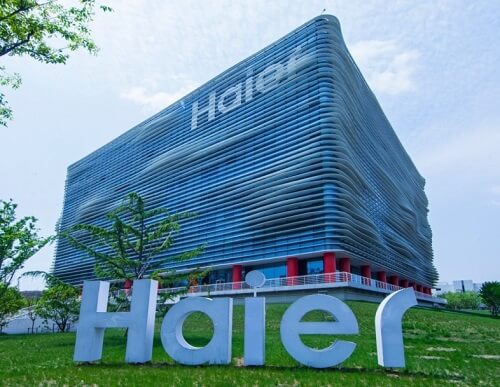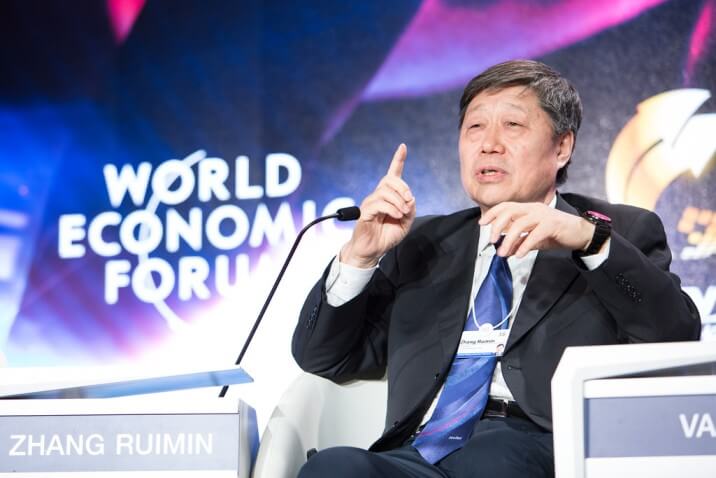Haier CompanyThe Haier Group Corporation is a Chinese multinational corporation headquartered in Qingdao, Shandong. The firm specializes in household appliances as well as consumer electronics. Since its founding in 1984, Haier Group has become a leading product and service producer that contributes to creating beautiful lives. When it comes to innovation and entrepreneurship, Haier has always committed to the philosophy of "prioritizing the value of people." The Rendanheyi Model was suggested by Mr Zhang Ruimin, chairman of the Haier Group Board of Directors and CEO. It has since been adopted and replicated across industries and cultures for its modern design, universal applicability, distinctive features and social qualities 
Products like freezers, Ac, washing machines, dryers, kitchen appliances, cell phones, computers, and TVs are among those that Haier is responsible for designing, developing, manufacturing, and selling. Focusing on user experience and staying current with the times, Haier began as a small factory that was collectively owned and on the verge of going bankrupt. Since then, the company has grown into an ecosystem at the forefront of the Internet of Things (IoT) era and is the only IoT ecosystem brand to be included in BrandZ's ranking of the top 100 most valuable global brands. (The marketing research consultants Millward Brown and WPP were responsible for developing the Brandz model. BRANDZ is a tool for diagnosing and predicting brand equity). In 2018, the Haier Group achieved a global turnover of RMB 266.1 billion, which was a 10% increase from the previous year; its global profits and taxes surpassed RMB 33.1 billion, which was also a 10% increase from the previous year; and its ecosystem revenue managed to reach RMB 15.1 billion, which was a 75% increase from the previous year. Acquisitions of Haier CompaniesAn incubator firm is an organization engaged in fostering early-stage companies through the various developmental stages until the companies have adequate capital, human, and material resources to function on their own. To this day, Haier has successfully incubated six businesses, including four listed companies, two unicorn companies, two quasi-unicorn and gazelle companies, and two companies that fall somewhere in between. In addition, Haier has created more than a hundred research and development centres, twenty-five industrial parks, one hundred and twenty production units, and one hundred and eighty marketing centres throughout the globe. In addition to this, Haier is proud to have a vast retailer network that spans over 160 countries all over the globe. It is the owner of many well-known names in the smart appliance industry, including Casarte, Leader, GE Appliances (USA), Fisher & Paykel (New Zealand), AQUA (Japan), and Candy (Italy), as well as several well-known names in the service industry, including, Yingkang Life, RRS, and COSMOPlat (Russia). Founder and CEO of Haier
Zhang Ruimin is a prominent figure in the Chinese business world and serves as the chief executive officer of the Haier Group. To provide just one example of his achievements, he is credited with rescuing a small, failing refrigerator firm and growing it into the world's fourth biggest white appliances producer. In 1949, Zhang Ruimin was born in Laizhou, Shandong, China, to parents who were both working-class textile factory workers. Zhang was a young man when he was caught up in the Cultural Revolution, and like a great number of other students, he joined the Red Guards as the movement spread across the nation. Since all the schools were closed, he went to the site where Mao was born and participated in protests in Beijing. As a result, he could escape being transferred to the countryside when the movement was ultimately put down. Zhang could not attend university because of the broad instability; as a result, he started his career in Qingdao in 1968, working for a state-run construction firm in obscurity. In 1984, Zhang was given the position of general manager of the Qingdao Refrigerator Plant, the firm that would later become the Haier Group. At the time, the company was insolvent and on its way to filing for bankruptcy. In 1985, Zhang Ruimin took the initiative to destroy 76 faulty refrigerators to promote employee support for the goal of creating the company's brand and raising their knowledge of the importance of quality. It was a turning point that helped Haier become a household name. Zhang made a trip to Germany early on in his term as general manager to pay a visit to the firm's German partner, who was the source of the technology that the company was purchasing. He rapidly concluded that the corporation had a significant issue in terms of its reputation and quality. This reflected negatively upon his nation and brought shame to his homeland. Zhang decided to do a demonstration utilizing some of the factory's output so that his employees could better understand the meaning of quality. The next year, the company's refrigerators did very well in the domestic market, particularly in big cities like Beijing (the capital of China) and Tianjin. In addition, Zhang was responsible for implementing many revolutionary economic changes during the period in which the state controlled the Chinese economy. Zhang linked employee pay scales with the revenue generated by the items they created to boost productivity. In addition, he established a policy in which each employee who made a mistake was required to address their colleagues and provide an explanation for the mistake. Zhang also presented one more novel idea, and that was the concept of consumer feedback. After seeing that sales were slow in the region of Sichuan, he investigated the cause and found that the problem was caused by locals who used the machines to wash sweet potatoes, which caused the drains within the washers to get clogged. In response, Zhang requested that his firm redesign the device so that it could also be used to wash vegetables in addition to garments. How Haier worksThere are just a few handfuls of businesses worldwide that have successfully broken free from the shackles of bureaucracy. The Chinese company Haier, one of the world's leading makers of white and brown items and has over 80,000 people, has done just that. Twenty years ago, the Chinese firm struggled with the typical issues of bureaucracy, procrastination, disengagement, and a lack of entrepreneurial spirit. Under the direction of the brave CEO Zhang, the company decided to go on a transformation program to restore the drive, entrepreneurship, and speediness that had been lost. This was done to make things better. This was accomplished with the help of two primary guiding concepts.
Haier's new organizational structure is the most notable aspect of the company's transformation. The pyramidal structure was dismantled and replaced with a network of over 4,000 highly independent microenterprises as the new organizational structure. Typically, a micro-enterprise may employ between 10 and 15 people and operate as a separate corporation. These autonomous units will contract with one another to supply goods and services. Every micro-enterprise can make decisions in three key aspects essential to the business.
Micro-Enterprises may be roughly divided into two groups:
A significant number of the customers who use its devices for gaming were dissatisfied with its performance. The micro-business saw a need in the market for high-performance laptops and went out to fill it. The group presented their concept on an internal forum at Haier and started a new micro-community with the goal of designing, producing, and selling gaming laptops. Several components of the task, such as design and engineering, were outsourced to other micro-enterprises to create a prototype. After everything was set up, customer input was collected, an estimate of future demand was created, and the product was put into production. The micro-business that makes gaming laptops subcontracted the relevant work to micro-businesses that handle purchasing and production. Finally, the marketing micro-business came into action. The gaming laptop was an overnight sensation, and the earnings from its sales were distributed evenly among the members of the huge community. This is an example of how Haier employs very simple components to build something incredibly complicated. The company Haier is structured to have zero gaps between itself and its consumers, and each employee is encouraged to think and act like an entrepreneur. The results don't need to be explained. The income and profitability of the appliance industry have increased by 20 per cent annually over the last ten years, and the market value of the firm as a whole has increased by more than two billion dollars, thanks to the new projects the company has embarked upon. Haier has effectively reinvented itself by eliminating bureaucracy and releasing a successful network of entrepreneurial teams. Social Work Done by the Haier GroupThe Haier Group displays the same zeal and enthusiasm for humanitarian initiatives. The mission of the organization, known as Project Hope, is to provide underprivileged and impoverished children with the opportunity to get an education. Since its inception, it has provided financial support to more than 186 educational institutions. In addition, the business makes an effort to address environmental issues and shows great excitement for the act of tree planting and the promotion of 'green' concepts. Additionally, the corporation often hosts sporting events and runs charitable outreach activities. TechnologyHaier started researching how the internet of things may be incorporated into their products in 2015. The Stanford Artificial Intelligence Laboratory recognized the firm, which discovered three obstacles to adopting smart home technology: a lack of standardized protocols/single point of access, passive services, and the absence of full solutions. The huge home appliance market was where Haier's key strengths were at the time, not the consumer electronics market for smaller devices. After that, to make up for their deficiencies, they formed a strategic alliance with the industry-leading Internet of Things (IoT) platform IngDan, which the Cogobuy Group then owned. They incorporated IngDan's portfolio of components, modules, and edge speech analysis into smart appliance solutions using the ecosystem and supply chain Cogobuy provides. Within the main appliance sector, Haier has launched its intelligent home appliances over seven product lines: air, water, garments care, security, voice command, health, and information. A Subsidiary of Haier GroupThe Haier Group is one of the consumer durables corporations expanding at one of the highest rates in the world, and Haier India is a wholly-owned subsidiary of the Haier Group. The firm began its commercial activities in India in January of 2004, and they have already completed a full decade there. Since the company's foundation, Haier has introduced various groundbreaking goods across all key product categories, such as freezers, air conditioners, washing machines, LEDTVs, water heaters, and microwave ovens. Haier was the first to market with their groundbreaking Bottom Mount refrigerators in India. Since then, the company has introduced many more groundbreaking products, including the patented Double Drive technology in washing machines, motion gaming technology in LCDs, Near Zero Pressure (NZP) technology in washing machines, smart convertible space in three-door refrigerators, music features in water heaters, and many more. Among the 16,000 brands researched by Trust Research Advisory in 2011, Haier was recognized as India's 19th Most Trusted Brand. This ranking was based on the company's extensive dealer network, which includes a presence in more than 6500 retail locations nationwide.
Next TopicHonda Company
|
 For Videos Join Our Youtube Channel: Join Now
For Videos Join Our Youtube Channel: Join Now
Feedback
- Send your Feedback to [email protected]
Help Others, Please Share









